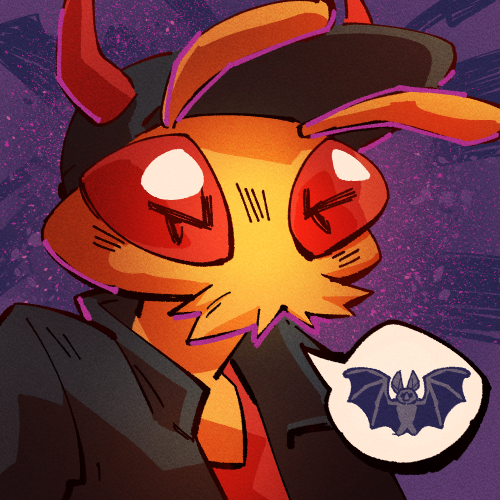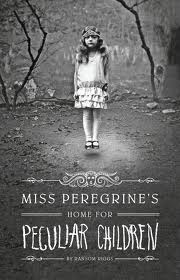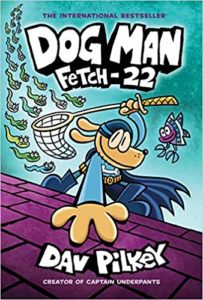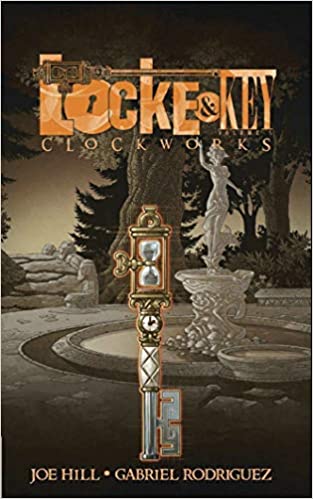Content note(click for details)
Content note: discussion of suicideHe was lost in the guillotine section of the big department store. He could never have guessed there was such a thing, or he might have taken more care when the doors of the elevator opened and let him out. He was on the wrong floor. The lighting here was dim and bloody, the lamps shaded to deliberately cast a gory glow over the items that were on sale. It was crude and unfair. By the time he realised his error he had already wandered too far into the enormous room and his sense of direction was confused. He had no idea how to get back to the elevator.
Members of staff were gazing at him as if he was a violation of this refined space, a drifting smell or spreading stain. Conscious of their eyes on his back, he pretended an interest in the products on offer. He studied the blades, stroked the rough ropes and tapped the wooden frames. Nodding to himself and muttering, he tried to broadcast a message, to somehow radiate his intention to return another day, maybe tomorrow or next week, and purchase a model. In the meantime he was browsing, testing, and yes, he was sincere and innocent, a real customer.
His random passage took him in a circle that consisted of epicycles, a meandering path that perhaps resembled the rolling of lopped heads in some idealised schematic of brutality. At last a tall man approached. They were all tall on this floor, these members of staff, horribly tall as they stood in their unexpected corners, but the altitude of this one was especially remarkable. And yet he wore a coat too long for his body. His posture was rigid, beyond militaristic, and his moustache bristled, but then he smiled and made a little bow, as if he was sniffing a bowl of soup.
The others were watching carefully. There were no customers on this floor apart from him, just staff members, and it was clear the extra tall man was the floorwalker, that he could cover the distances necessary in next to no time at all with his long legs, that he was feared by his colleagues. Within that fear was awe, and nested in the awe was love, but more fear underpinned the love. These secret layers of regard were the geological strata of a commercial tyrant, as difficult to erode as the igneous slabs of a towering sea stack bathed in spray at high tide.
But they were far from the ocean now. This department store was located in a city in a landlocked country, and the land undulated with hills all around, not waves. Then the floorwalker clasped his hands theatrically.
“May I be of assistance, monsieur?” he asked in an accent that was so courteously forbidding that the syllables of his words were like crumbs of biscuits too durable to dissolve in strong tea. “And if not, why not?”
“I’m just browsing today.”
“But what exactly does monsieur have in mind?”
“My name is Mr. Plum.”
“Come now, monsieur, you must have some idea of the particular model you are most interested in? We have every kind of guillotine in stock, the full historical and futurological range. There are the cruder versions that hack and the improved devices that slice. We have long drop and short drop models. Those that catch the blood and others that allow it to trickle or even spray.”
“That’s very helpful.”
“But is it helpful to you, monsieur?”
“My name is Mr. Plum. I was born in this country too. I haven’t yet decided what I need. I’m just browsing, for a friend.”
“For a friend, you say? That strikes me as unusual.”
“For an enemy, I mean.”
“Then it is for yourself you are shopping!”
“Yes, but I wasn’t…”
There was no point arguing. He was out of his depth with this fellow, this utterly lanky floorwalker, a man who was probably never out of his depth anywhere, even while wading across a continental shelf, not that the department store was nearer the ocean now than before. Not enough time had passed for sufficient tectonic activity to take place. Yet it felt as if he had already been trapped here for innumerable years. And now the floorwalker was taking full charge of his destiny, leading him not by the hand but with a form of mercantile magnetism.
Mr. Plum muttered to himself, “I only came into this store for a kettle. I got out of the elevator at the wrong floor, that’s all. I’m reading a book at home, a difficult book. I wanted a coffee break but I don’t have a kettle. I will return to my book when I can. With or without coffee, I’ll read it to the end.”
“Is monsieur troubled?”
“Not at all. No, wait, I want to know where we are going.”
“To browse the products.”
“I see. Yes. That’s your answer, is it?”
“Monsieur stated that he wished to browse. I can facilitate that wish. I am not yet a genie but I have the capability of making some wishes come true. The easy wishes, mostly. Your wish is a very easy one.”
Mr. Plum shrugged. He did this because his shoulders were trembling. The nerves inside his torso were vibrating unbearably. The shrug untied some unwholesome knot and he was well again. Able to walk, to accompany the very tall man, they stopped together next to an apparatus that might have been a grandfather clock rather than a guillotine. And it was explained to him that yes, it told the time as well as lopped off heads. It had been designed for the parlour, for people who still had parlours in their houses, and did monsieur have a parlour too?
“Not really. No, I don’t.”
The look he received was so withering, he added, “Sorry.”
“This way, monsieur!”
They passed squat machines with iron frames and no ornamentation, practical but unlovely, and highly rococo golden devices that soared almost to the ceiling, splendid but equally terrible. They were heading towards a very large guillotine that stood on a platform by itself, like an actor on stage about to recite a monologue. A long wooden ramp connected the lunette of the machine with the lane of a bowling alley. Skittles in the form of little human figures stood and waited for a severed head to roll along and knock them down. Execution as recreation.
“What does monsieur say?”
“It’s too big. It wouldn’t fit in my house.”
“For the garden. An outdoor model. You can sit in a chair and knit while the heads roll down the ramp. Does monsieur knit?”
“Not even cardigans, I’m afraid. And I don’t have a garden.”
“But are you not educated?”
“Of course. I have a university degree.”
“A bachelor’s degree then? Well, that can’t be helped. There are other models to show you. This way, monsieur!”
And they were off again, passing rows of guillotine variants that removed heads with circular blades or blades like the rotors of a propeller. One was simply a perfect replica of a breadknife but enormously magnified and fixed on a pivot to a board as wide as a double bed. Another was a bed, with the blade activated by springs in the mattress. A particularly grotesque version was a giant pair of crimping scissors and Mr. Plum could imagine the muted snip as the blades closed together and left a stump of a neck with bloody corrugated edges.
“Keep going, monsieur.”
“I like the look of the one over there.”
He realised it was a mistake to say this, but he desperately wanted to divert their path away from the hideous coffin-like contraption that stood directly ahead of them, a guillotine that clearly sliced sideways rather than vertically. He didn’t want his body in proximity with such a thing. The one he had pointed out was small and inoffensive in comparison, the sort of contrivance one might keep on a coffee table in the lounge without running the risk of adverse comments from visiting friends. It was like a little cabinet with a door, the blade hidden within.
“Monsieur, this is considered to be a lady’s guillotine. Akin to one of those pearl handled revolvers that ladies keep, or kept, in their handbags. Monsieur! But you are not buying a gift for wife or mistress! You are browsing for yourself. We worked this out using logic only a few minutes ago!”
Mr. Plum spoke thickly, as if congealed blood already clogged his throat. “Perhaps I myself am a wife or mistress. Perhaps.”
The floorwalker arched his lush eyebrows and now they were so high that to reach them for a plucking a woman with tweezers would require an extendable ladder. Or a man with that ladder could conceivably pluck them. It was a modern city, despite its remoteness from the ocean, from the trading networks, from foreign news. For long moments the eyebrows remained up there. He kept his eyes fixed on them. Then they descended soundlessly, at last, and he heaved a sigh of relief, for the floorwalker was smiling. They didn’t descend like blades.
“I understand. You jest. It is for a masque, a fiesta.”
“For one of those, yes.”
“A malign fiesta. In that case, permit me to explain its workings.”
“I grant you permission.”
“You open the door and ask your enemy to smell the interior. Your enemy falls for the deception. They insert their head into the space and inhale. The drop of pressure inside the box then activates a switch that causes the blade to fall. The drop is short, too short for a decapitation. The neck is only partly severed. The victim stands up in surprise and pain. Now the box is attached to his head. He can’t get it off, so you will offer to help. You take hold of it with both hands, a firm grip, and you twist with all your strength. That finishes him off.”
“I see. But what does the inside smell like?”
“Pine resin varnish, monsieur.”
“My name is Mr. Plum.”
“May I suggest that monsieur try it out in the changing room?”
“But I haven’t decided.”
“May I insist that monsieur try it out there?”
The other staff members giggled. They were still standing in their corners, in the alcoves and niches of the walls. He licked his lips. Ought he to make a run for it? But it was futile. The long legs of those man-spiders would catch up with him, they would converge on his fleeing form from all directions. He was doomed that way. The only chance he had was to continue the charade and somehow come out the far end in one piece. He shrugged again, nodded and lifted his hands in mock surrender. The echoes of the giggles faded away. Silence reigned.
Swooping on the box with his long arms, the floorwalker snatched it up in gnarled and massive palms and conveyed it to the nearest changing room. Mr. Plum followed in his wake, pulled along on invisible strings.
The curtains in front of the changing room were dyed the brightest of pulsating reds. But the floorwalker swept them aside and ushered him inside, then he placed the guillotine on the coffee table that was the only item of furniture in the oval room. He departed and closed the curtains after him and Mr. Plum was left alone with his anxiety and his imminent death. He turned to examine his reflection in the mirror, but there was no mirror. There was a screen on which shapes flickered. They were a projection but he was unable to locate the projector.
The shapes achieved greater clarity, came into full focus. And now sounds rose all about him from hidden loudspeakers. The baying of a mob. The shapes were figures of men and women, those who had come to watch a public execution. It was only an illusion, but it unnerved him. He wondered if he ought to thrust his head into the box and hold his breath for a minute, then withdraw and claim the apparatus was broken. Hadn’t the floorwalker told him it was operated by the breath of the victim? But that would only buy him a little time, not enough.
The alternative was really to cut off his own head and have done with it. His body resisted this option, he felt nauseous. What should he do? Remain in this room until after closing time and then hope to sneak out when the staff were gone? But he wasn’t sure the floorwalker ever left the department, or even had a home to go to. It seemed implausible. Then an audacious idea came to Mr. Plum. Picking up the box and turning on his heel, he pushed his way through the curtains without parting them. He looked neither to left or right but marched out briskly.
With his best attempt at a confident voice, he stopped before the floorwalker and said, “Yes, it works perfectly fine. I’ll take it.”
“Monsieur actually tried it?”
“Of course I did.”
“And the result for monsieur was?”
“It’s just what I need.”
“But… but did monsieur follow my instructions?”
“To the smallest detail.”
“You pushed your head into the box and breathed in.”
“Yes. Then the blade fell.”
“And it cut off your head? But I don’t see…”
“It didn’t cut it off entirely. No. I had to twist the box around several times before that happened. Then I knew it was a good device and I picked up my head and put it back on my neck. I wish to buy it.”
“Well now. Does monsieur want it gift wrapped?”
“No need. I’ll take it as it is.”
The floorwalker lifted his immensely long arms and let them drop again and this gesture was one of the deepest disappointment. The tall men in corners and alcoves groaned in unison. Mr. Plum reached for his wallet. He was acutely aware that all eyes were probing his bare neck, searching for the join, for the mark. Not finding it, they would grow suspicious very rapidly, but he might well be out of here before they had time to stop him. It was just a question of finding the elevator. Or maybe there was a flight of emergency stairs somewhere near?
“How much is it?”
“One large and tarnished penny, monsieur.”
“I only have a florin.”
“We don’t have change in the till.”
“Do you even have a till? No, don’t answer that! Keep the change. Keep it until it does change. Until you change.”
“Monsieur is very generous. Very wise.”
“And the way out?”
The floorwalker pointed in two different directions with two of his long arms and Mr. Plum went in a third direction, clutching his guillotine and whistling, but his breath came in shuddering gasps and even when he saw that he was indeed heading straight for the elevator doors his lungs still rasped against his ribcage and every step was an ordeal. But no one followed him. He had won. He pressed the red wall button and the door opened immediately. Then he stepped inside and it closed. He stood to attention, wondering if this box was a guillotine too.
No, it wasn’t. The elevator descended to the ground floor. He stepped out and left the department store. It was early evening already. As soon as he stood in the street, a smile formed on his face and he uttered the words, “I’m free.” The nearest tram stop was only a short distance away. He caught a tram back to his own district, walked for fifteen minutes to his apartment block, tramped up the stairs to the level on which he resided. He placed the guillotine on the floor, groped for his key and opened the door, then picked up the box and carried it inside.
The kitchen was a melancholy place. It still had no kettle. He found space for the guillotine on the counter next to the blender.
Then he went into his study to resume reading a book, the book he had abandoned halfway through, the difficult book. It was the oldest book he owned and he couldn’t recall how it had come into his possession. He sat at his desk and frowned. The words on the page no longer made sense. Even the individual letters were incomprehensible. They resembled bubbles within bubbles. He flicked through the volume rapidly. The same script filled every page. The language the book was written in must have gone extinct while he was shopping in the store.
That did sometimes happen. But what bad timing! What was the solution, if any? He turned his head in the direction of the kitchen. Surely an extinct man was the kind of man who would be able to read an extinct language with ease? But suicide was a drastic action to take for the sake of finishing a book, one he hadn’t found especially entertaining even when he was able to understand it. A desire to chop the book in two overwhelmed him. “I’m not free at all,” he told himself as he stood and wandered out of the study. “None of us can ever be that.”
© 2020 by Rhys Hughes
Author’s Note: The belief that a complete story can grow from a small seed, from just one idea or something even smaller than an idea, an image, a remark, or in this case a pun that just popped into my mind one day for no reason, ‘Are you Being Severed?’ And the moment I had those words I had the story entire. It grew in my mind with an inevitability that seems to have little to do with any conscious effort on my part. Watching the still unwritten story unfold in my mind was like watching the spreading of a pool of water from an upset jug. It just formed a pattern, the pattern it couldn’t help but form. Then it was merely a case of me setting down in words that story and its pattern. I also wanted to see if it was possible to include the sorts of allusions and puns that many readers feel lessens a story’s impact in such a way that the impact isn’t lessened at all. I wanted to find out if such tricks might even enhance the impact. That is how this story came into being.
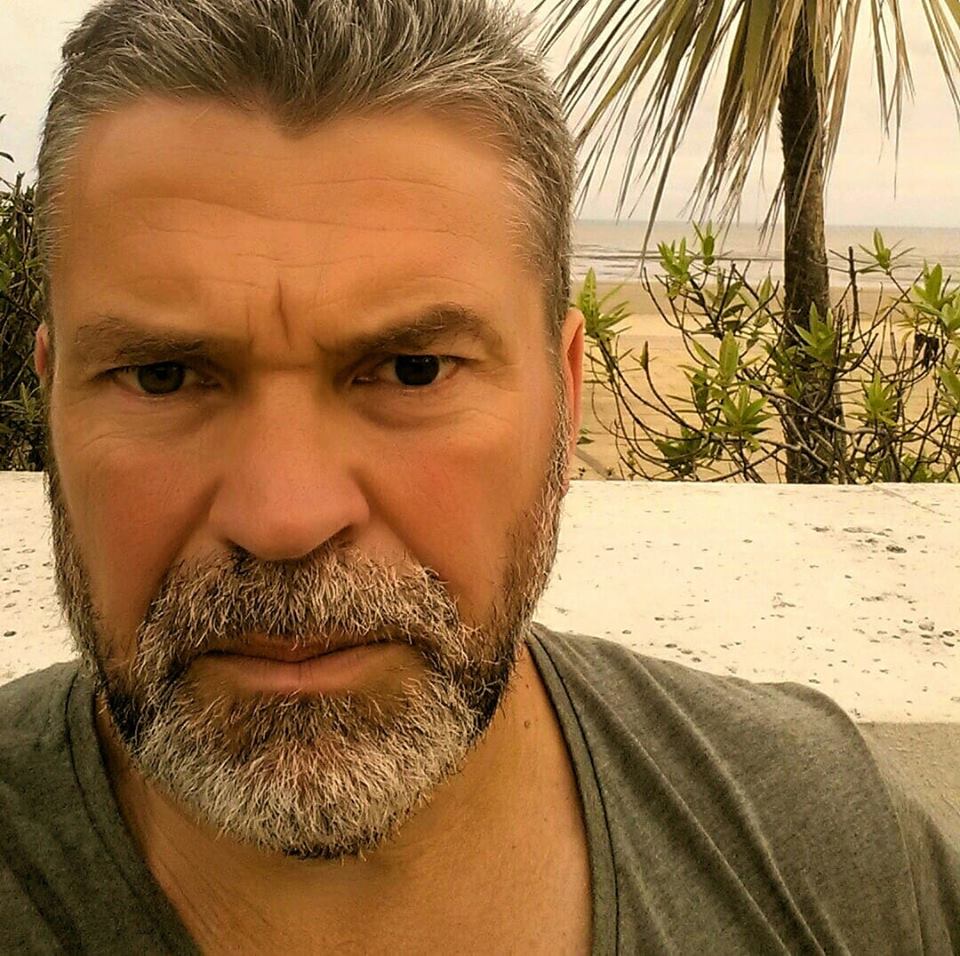
Rhys Hughes was born in Wales. His first book, Worming the Harpy, was published in 1995. Since that time he has published fifty other books, more than nine hundred short stories, and innumerable articles. He graduated as an engineer but now works as a tutor of mathematics. His most recent book is an epic poem, The Meandering Knight, and he is currently working on a collection of experimental stories to be called Comfy Rascals. His blog may be found at http://rhysaurus.blogspot.com
If you enjoyed the story you might also want to visit our Support Page, or read the other story offerings.

